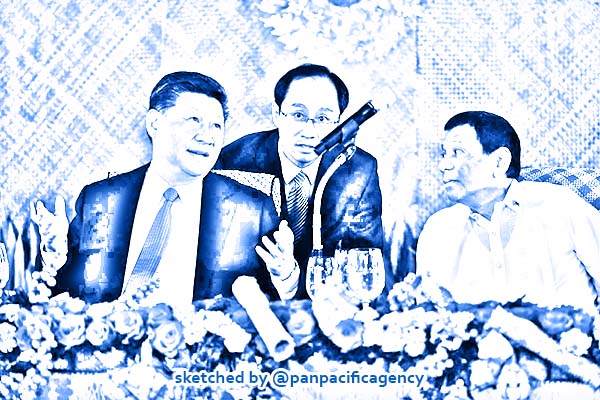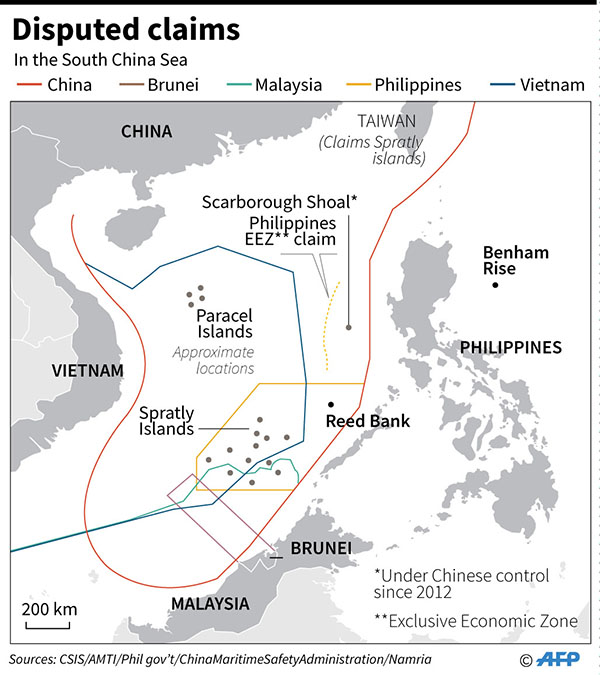[Analytics] Duterte vows to take a tougher tack on China

Chinese President Xi Jinping (L) and Philippine President Rodrigo Duterte (R) at the Malacanang Presidential Palace, Manila, November 20, 2018. Photo: AFP/Mark Cristino/Pool. Sketched by the Pan Pacific Agency.
Philippine President Rodrigo Duterte, under fire at home for not taking a tougher stand vis-à-vis China in the South China Sea, has promised to drop a diplomatic gauntlet during his trip this month to Beijing. Richard Javad Heydarian specially for the Asia Times.
In an avowed policy shift, Duterte says he will formally raise the July 2016 Permanent Court of Arbitration at The Hague ruling in favor of the Philippines over China, a decision which nullified Beijing’s expansive claims to the South China Sea.
Duterte opted to “set aside” the landmark ruling soon after winning office in mid-2016, prioritizing engagement over confrontation with China. Beijing has flatly rejected the ruling as “null and void”, arguing that the tribunal had no jurisdiction over the issue.
Instead, Beijing has moved to consolidate its position in the contested sea, building up facilities and militarizing features it controls, including within the Philippines’ claimed exclusive economic zone (EEZ).
Most recently, Duterte said he brokered a secret deal to allow Chinese fishermen to exploit Philippine waters. The announcement sparked new controversy and came as Philippine top brass fired rhetorical broadsides at China’s recent activities and perceived threats in nearby waters.
Duterte’s announcement that he will raise the arbitral ruling while in Beijing is clearly designed to appease his domestic critics and ease the general public. It also likely aims to pave the legal way for new resource-sharing deals with China in contested areas of the sea.
Previous proposed joint deals have come under fire from critics as unconstitutional, unless Beijing acknowledges Philippine sovereignty over maritime areas that are to be jointly explored and exploited.
“The arbitral ruling, we will talk about [it]… That’s why I’m going to China,” the Filipino president announced during a high-profile speech on August 6 to the Filipino-Chinese Chambers of Commerce and Industry. “I’m going to China to talk. Did I not tell you before, that before my term ends, I will be talking about the [South] China Sea?” he added.
Previously, Duterte maintained that raising the arbitral award would be futile considering Beijing’s hard line on the ruling, and ran the risk of stoking what he has maintained would be a potentially “suicidal conflict” with China.
His apparent change of heart on the ruling has been welcomed by prominent Filipino statesmen, many of whom have called for his administration to draw a harder line in the South China Sea.
Senator Panfilo Lacson, an independent senator and likely future presidential candidate, said that it was “about time” for Duterte to raise the issue with his Chinese counterpart Xi.
“It should have been done earlier. We need to discuss this thoroughly. So it’s perfect timing since there will be a meeting with President President Xi Jinping…” he told reporters last week in Manila.
One of Duterte’s leading critics, former foreign secretary Albert del Rosario, the top official involved in filing the arbitration proceedings against China at The Hague tribunal, likewise welcomed Duterte’s announcement.
“Let us salute him and assure him of the support of all Filipinos,” the former diplomatic chief said.
Current Foreign Secretary Teodoro Locsin has backpedaled somewhat by saying Duterte’s bilateral meeting with the Chinese president has yet to be finalized.
“There is no final date yet. I will be talking to the Chinese ambassador and finalize the agenda,” the Filipino top diplomat said. No official dates for Duterte’s trip have been announced. Last November, Xi visited Manila and promised billions of dollars worth of new aid and investment.
At the same time, there are reasons to doubt Duterte will diplomatically confront Xi on the South China Sea during upcoming talks in Beijing. Duterte’s upcoming tour will mark the fifth time he has visited China during his three years in office.
Significantly, Duterte’s announcement came just days after his top generals, including Defense Secretary Delfin Lorenzana and National Security Advisor Hermogenes Esperon, expressed their concerns about perceived as rising Chinese threats to Philippine sovereign interests.
Those concerns were most recently sparked when Chinese warships switched off their Automatic Identification System (AIS) while passing through Philippine territorial waters.
In response, Armed Forces of the Philippines (AFP) spokesperson Brigadier General Edgard Arevalo openly accused Beijing of “duplicity” and “deception.”
Moreover, Lorenzana accused China of “bullying” behavior towards the Philippines, and openly criticized the reported presence of several Chinese warships and surveillance vessels within Philippine waters without prior notice.
“What we need really is to allay the fears of the neighbors of China, to inform the other countries what their ships are doing there, not only the survey ship, but also their warships passing through our territorial waters,” the defense chief said on August 8.
“If the intention is only to study the sea or the fish, marine life there, then it is not a security threat. But if they’re doing other things like making reconnaissance or surveillance of our positions, then it’s a threat,” Lorenzana added.
He also agreed with US Defense Secretary Mark Esper’s recent criticism of China’s actions, including how it “reclaimed shoals or reefs and made them into artificial islands, and they put long runways there, structures, and landed military aircraft and put in defensive weapons.”
Lorenzana has also questioned China’s claim that the militarization of disputed sea features are strictly defense as weapons systems including missiles can be “turned into offensive capability in an instant.”
The defense establishment has also opposed recent plans by Chinese companies to lease strategic islands in the country’s north (Fuga) and northwestern waters (Chiqita and Grande), fearing the investment plans could have hidden dual purposes.
Lorenzana recently suggested the navy should position a new detachment in the northernmost region for monitoring purposes.
Earlier this year, Lorenzana also nixed on national security grounds a proposed deal that would have allowed Chinese companies to purchase an indebted shipyard at Subic Bay, which also hosts naval facilities.
At the same time, Duterte has remained steadfast against allowing the US to bolster its position in the Philippines, voicing opposition to any discussions towards allowing America to place missile defense systems on Philippine soil.
The US and Philippines recently reviewed the terms of their 1951 Mutual Defense Treaty (MDT), which requires both sides to come to the others’ defense in the case of a foreign attack.
“There’s an item in the newspaper that they [the US] are going to place some ballistic mid-range [missiles]. That can never happen,” Duterte said before the gathering of Filipino-Chinese business leaders at the Malacañang presidential palace.
“That will never happen because I will not allow [it] because it’s also a violation of the Constitution. You cannot place nuclear arms in the Philippines,” he added.

The leader also said that he will not allow any “foreign troops, not only the Americas, in my land”, and that he wants to avoid stoking already simmering Sino-American tensions in the region. “If you want a fight, fight among yourselves,” he added.
During his State of the Nation Address speech in July, Duterte tried to justify his controversial decision to allow Chinese fishing vessels to enter Philippine waters by citing “traditional fishing rights” of other nations around the contested Scarborough Shoal, a feature China has occupied after a naval standoff in 2012.
Analysts believe Duterte will likely try to use the arbitration award and resource-sharing provisions under international law as legal justification for a proposed joint oil exploration deal with China in contested areas.
“They have proposed a 60-40 (split of oil development profits). That’s OK with me, but that could be a later topic if we have time,” the president said on August 8, promoting a proposed energy development deal with China in the sea’s contested Reed Bank area.
Top diplomat Locsin had earlier praised China’s draft joint-exploration agreement as “superior to our own” and recently tweeted that “everything [is] going well” in regards to negotiations over a Reed Bank joint deal.
While Duterte has promised at home to take a tougher stand against China, that message will likely be more nuanced and conciliatory behind closed doors later this month in Beijing.